Leadership and Crisis: The Trump Administration's COVID-19 Response
VerifiedAdded on 2023/01/04
|7
|2537
|38
Case Study
AI Summary
This case study report analyzes Donald Trump's leadership and response to the COVID-19 pandemic, highlighting the devastating impact on America with over 8 million cases and a death toll exceeding 200,000. The report details Trump's initial downplaying of the virus, his shifting blame to China, and the delayed implementation of public health measures. It explores the resulting economic decline, social inequalities, and the exposure of political divides within American society. The analysis delves into Trump's leadership style, classifying it as a form of 'Messiah leadership' and evaluating its impact on public trust and societal divisions. The report concludes by recommending Eco-leadership as a more effective approach to address the crisis and foster unity. It also references various sources to support the analysis.
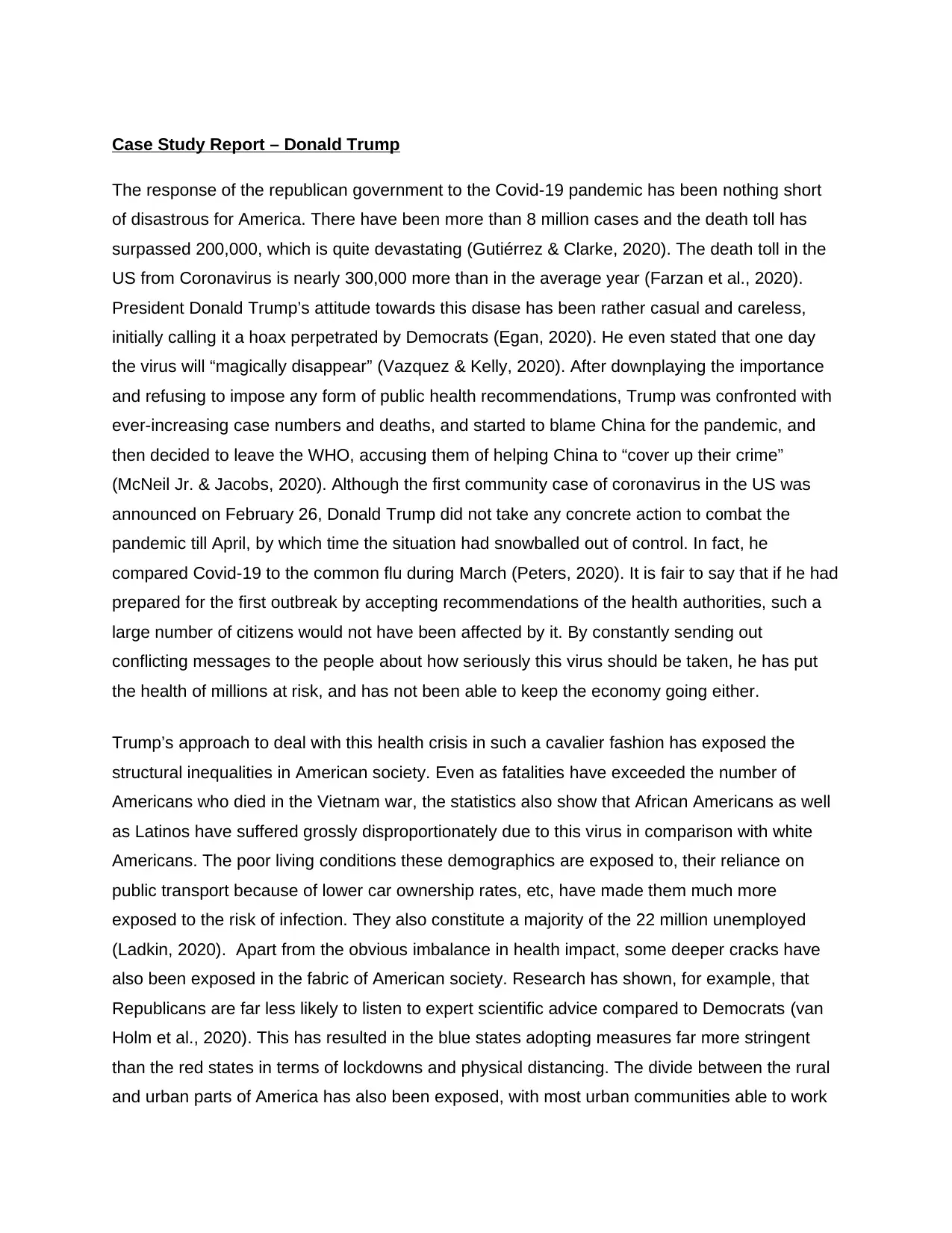
Case Study Report – Donald Trump
The response of the republican government to the Covid-19 pandemic has been nothing short
of disastrous for America. There have been more than 8 million cases and the death toll has
surpassed 200,000, which is quite devastating (Gutiérrez & Clarke, 2020). The death toll in the
US from Coronavirus is nearly 300,000 more than in the average year (Farzan et al., 2020).
President Donald Trump’s attitude towards this disase has been rather casual and careless,
initially calling it a hoax perpetrated by Democrats (Egan, 2020). He even stated that one day
the virus will “magically disappear” (Vazquez & Kelly, 2020). After downplaying the importance
and refusing to impose any form of public health recommendations, Trump was confronted with
ever-increasing case numbers and deaths, and started to blame China for the pandemic, and
then decided to leave the WHO, accusing them of helping China to “cover up their crime”
(McNeil Jr. & Jacobs, 2020). Although the first community case of coronavirus in the US was
announced on February 26, Donald Trump did not take any concrete action to combat the
pandemic till April, by which time the situation had snowballed out of control. In fact, he
compared Covid-19 to the common flu during March (Peters, 2020). It is fair to say that if he had
prepared for the first outbreak by accepting recommendations of the health authorities, such a
large number of citizens would not have been affected by it. By constantly sending out
conflicting messages to the people about how seriously this virus should be taken, he has put
the health of millions at risk, and has not been able to keep the economy going either.
Trump’s approach to deal with this health crisis in such a cavalier fashion has exposed the
structural inequalities in American society. Even as fatalities have exceeded the number of
Americans who died in the Vietnam war, the statistics also show that African Americans as well
as Latinos have suffered grossly disproportionately due to this virus in comparison with white
Americans. The poor living conditions these demographics are exposed to, their reliance on
public transport because of lower car ownership rates, etc, have made them much more
exposed to the risk of infection. They also constitute a majority of the 22 million unemployed
(Ladkin, 2020). Apart from the obvious imbalance in health impact, some deeper cracks have
also been exposed in the fabric of American society. Research has shown, for example, that
Republicans are far less likely to listen to expert scientific advice compared to Democrats (van
Holm et al., 2020). This has resulted in the blue states adopting measures far more stringent
than the red states in terms of lockdowns and physical distancing. The divide between the rural
and urban parts of America has also been exposed, with most urban communities able to work
The response of the republican government to the Covid-19 pandemic has been nothing short
of disastrous for America. There have been more than 8 million cases and the death toll has
surpassed 200,000, which is quite devastating (Gutiérrez & Clarke, 2020). The death toll in the
US from Coronavirus is nearly 300,000 more than in the average year (Farzan et al., 2020).
President Donald Trump’s attitude towards this disase has been rather casual and careless,
initially calling it a hoax perpetrated by Democrats (Egan, 2020). He even stated that one day
the virus will “magically disappear” (Vazquez & Kelly, 2020). After downplaying the importance
and refusing to impose any form of public health recommendations, Trump was confronted with
ever-increasing case numbers and deaths, and started to blame China for the pandemic, and
then decided to leave the WHO, accusing them of helping China to “cover up their crime”
(McNeil Jr. & Jacobs, 2020). Although the first community case of coronavirus in the US was
announced on February 26, Donald Trump did not take any concrete action to combat the
pandemic till April, by which time the situation had snowballed out of control. In fact, he
compared Covid-19 to the common flu during March (Peters, 2020). It is fair to say that if he had
prepared for the first outbreak by accepting recommendations of the health authorities, such a
large number of citizens would not have been affected by it. By constantly sending out
conflicting messages to the people about how seriously this virus should be taken, he has put
the health of millions at risk, and has not been able to keep the economy going either.
Trump’s approach to deal with this health crisis in such a cavalier fashion has exposed the
structural inequalities in American society. Even as fatalities have exceeded the number of
Americans who died in the Vietnam war, the statistics also show that African Americans as well
as Latinos have suffered grossly disproportionately due to this virus in comparison with white
Americans. The poor living conditions these demographics are exposed to, their reliance on
public transport because of lower car ownership rates, etc, have made them much more
exposed to the risk of infection. They also constitute a majority of the 22 million unemployed
(Ladkin, 2020). Apart from the obvious imbalance in health impact, some deeper cracks have
also been exposed in the fabric of American society. Research has shown, for example, that
Republicans are far less likely to listen to expert scientific advice compared to Democrats (van
Holm et al., 2020). This has resulted in the blue states adopting measures far more stringent
than the red states in terms of lockdowns and physical distancing. The divide between the rural
and urban parts of America has also been exposed, with most urban communities able to work
Paraphrase This Document
Need a fresh take? Get an instant paraphrase of this document with our AI Paraphraser
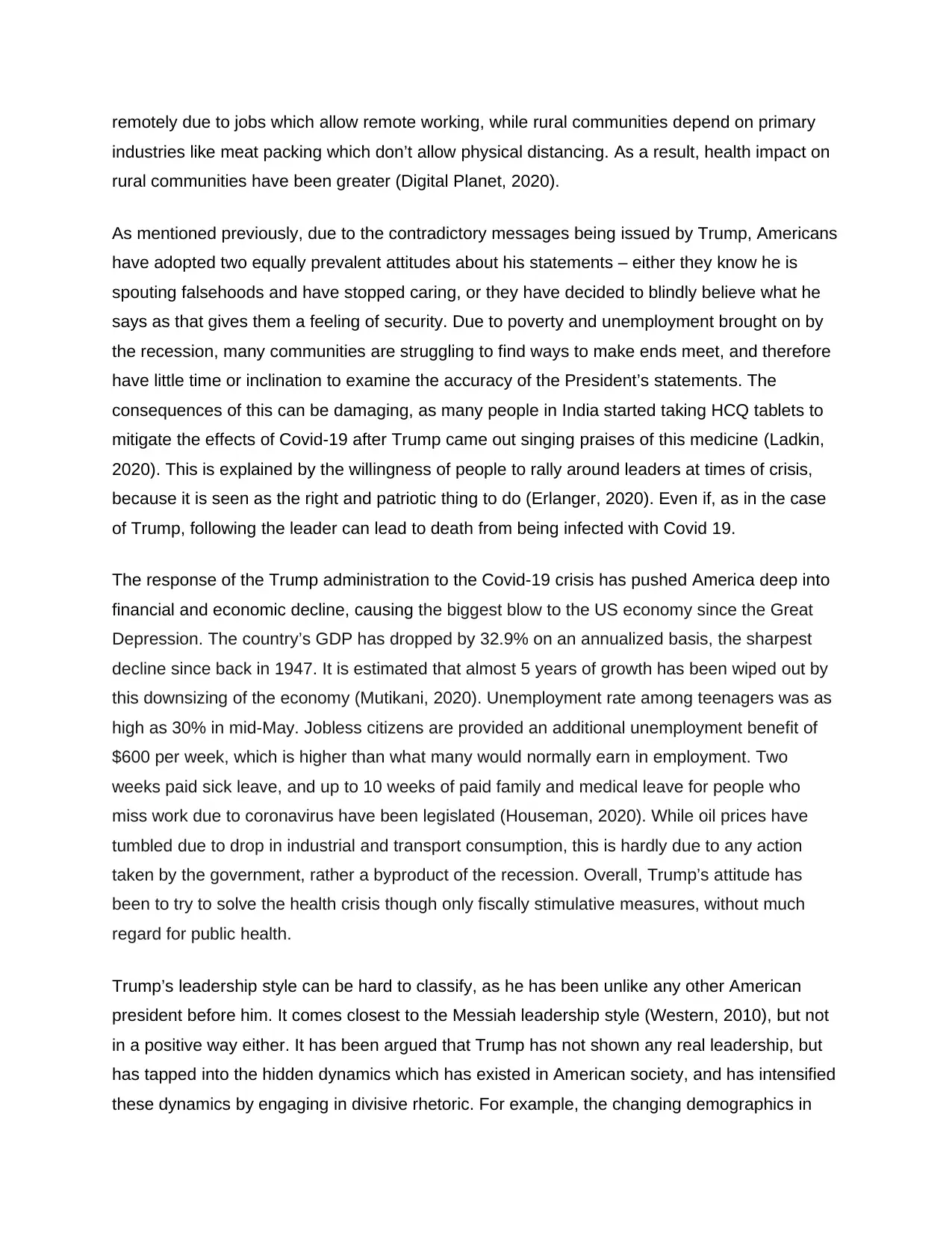
remotely due to jobs which allow remote working, while rural communities depend on primary
industries like meat packing which don’t allow physical distancing. As a result, health impact on
rural communities have been greater (Digital Planet, 2020).
As mentioned previously, due to the contradictory messages being issued by Trump, Americans
have adopted two equally prevalent attitudes about his statements – either they know he is
spouting falsehoods and have stopped caring, or they have decided to blindly believe what he
says as that gives them a feeling of security. Due to poverty and unemployment brought on by
the recession, many communities are struggling to find ways to make ends meet, and therefore
have little time or inclination to examine the accuracy of the President’s statements. The
consequences of this can be damaging, as many people in India started taking HCQ tablets to
mitigate the effects of Covid-19 after Trump came out singing praises of this medicine (Ladkin,
2020). This is explained by the willingness of people to rally around leaders at times of crisis,
because it is seen as the right and patriotic thing to do (Erlanger, 2020). Even if, as in the case
of Trump, following the leader can lead to death from being infected with Covid 19.
The response of the Trump administration to the Covid-19 crisis has pushed America deep into
financial and economic decline, causing the biggest blow to the US economy since the Great
Depression. The country’s GDP has dropped by 32.9% on an annualized basis, the sharpest
decline since back in 1947. It is estimated that almost 5 years of growth has been wiped out by
this downsizing of the economy (Mutikani, 2020). Unemployment rate among teenagers was as
high as 30% in mid-May. Jobless citizens are provided an additional unemployment benefit of
$600 per week, which is higher than what many would normally earn in employment. Two
weeks paid sick leave, and up to 10 weeks of paid family and medical leave for people who
miss work due to coronavirus have been legislated (Houseman, 2020). While oil prices have
tumbled due to drop in industrial and transport consumption, this is hardly due to any action
taken by the government, rather a byproduct of the recession. Overall, Trump’s attitude has
been to try to solve the health crisis though only fiscally stimulative measures, without much
regard for public health.
Trump’s leadership style can be hard to classify, as he has been unlike any other American
president before him. It comes closest to the Messiah leadership style (Western, 2010), but not
in a positive way either. It has been argued that Trump has not shown any real leadership, but
has tapped into the hidden dynamics which has existed in American society, and has intensified
these dynamics by engaging in divisive rhetoric. For example, the changing demographics in
industries like meat packing which don’t allow physical distancing. As a result, health impact on
rural communities have been greater (Digital Planet, 2020).
As mentioned previously, due to the contradictory messages being issued by Trump, Americans
have adopted two equally prevalent attitudes about his statements – either they know he is
spouting falsehoods and have stopped caring, or they have decided to blindly believe what he
says as that gives them a feeling of security. Due to poverty and unemployment brought on by
the recession, many communities are struggling to find ways to make ends meet, and therefore
have little time or inclination to examine the accuracy of the President’s statements. The
consequences of this can be damaging, as many people in India started taking HCQ tablets to
mitigate the effects of Covid-19 after Trump came out singing praises of this medicine (Ladkin,
2020). This is explained by the willingness of people to rally around leaders at times of crisis,
because it is seen as the right and patriotic thing to do (Erlanger, 2020). Even if, as in the case
of Trump, following the leader can lead to death from being infected with Covid 19.
The response of the Trump administration to the Covid-19 crisis has pushed America deep into
financial and economic decline, causing the biggest blow to the US economy since the Great
Depression. The country’s GDP has dropped by 32.9% on an annualized basis, the sharpest
decline since back in 1947. It is estimated that almost 5 years of growth has been wiped out by
this downsizing of the economy (Mutikani, 2020). Unemployment rate among teenagers was as
high as 30% in mid-May. Jobless citizens are provided an additional unemployment benefit of
$600 per week, which is higher than what many would normally earn in employment. Two
weeks paid sick leave, and up to 10 weeks of paid family and medical leave for people who
miss work due to coronavirus have been legislated (Houseman, 2020). While oil prices have
tumbled due to drop in industrial and transport consumption, this is hardly due to any action
taken by the government, rather a byproduct of the recession. Overall, Trump’s attitude has
been to try to solve the health crisis though only fiscally stimulative measures, without much
regard for public health.
Trump’s leadership style can be hard to classify, as he has been unlike any other American
president before him. It comes closest to the Messiah leadership style (Western, 2010), but not
in a positive way either. It has been argued that Trump has not shown any real leadership, but
has tapped into the hidden dynamics which has existed in American society, and has intensified
these dynamics by engaging in divisive rhetoric. For example, the changing demographics in
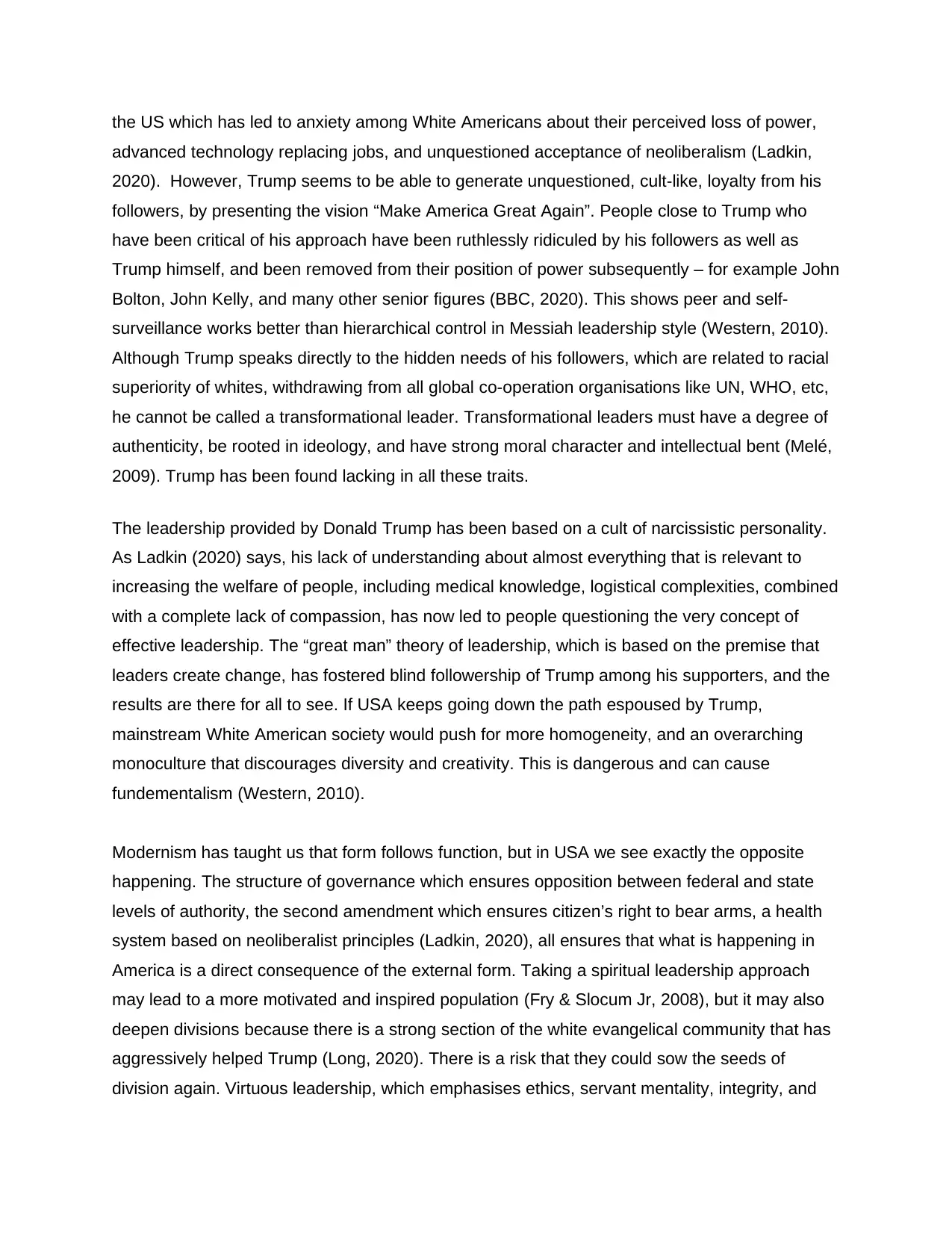
the US which has led to anxiety among White Americans about their perceived loss of power,
advanced technology replacing jobs, and unquestioned acceptance of neoliberalism (Ladkin,
2020). However, Trump seems to be able to generate unquestioned, cult-like, loyalty from his
followers, by presenting the vision “Make America Great Again”. People close to Trump who
have been critical of his approach have been ruthlessly ridiculed by his followers as well as
Trump himself, and been removed from their position of power subsequently – for example John
Bolton, John Kelly, and many other senior figures (BBC, 2020). This shows peer and self-
surveillance works better than hierarchical control in Messiah leadership style (Western, 2010).
Although Trump speaks directly to the hidden needs of his followers, which are related to racial
superiority of whites, withdrawing from all global co-operation organisations like UN, WHO, etc,
he cannot be called a transformational leader. Transformational leaders must have a degree of
authenticity, be rooted in ideology, and have strong moral character and intellectual bent (Melé,
2009). Trump has been found lacking in all these traits.
The leadership provided by Donald Trump has been based on a cult of narcissistic personality.
As Ladkin (2020) says, his lack of understanding about almost everything that is relevant to
increasing the welfare of people, including medical knowledge, logistical complexities, combined
with a complete lack of compassion, has now led to people questioning the very concept of
effective leadership. The “great man” theory of leadership, which is based on the premise that
leaders create change, has fostered blind followership of Trump among his supporters, and the
results are there for all to see. If USA keeps going down the path espoused by Trump,
mainstream White American society would push for more homogeneity, and an overarching
monoculture that discourages diversity and creativity. This is dangerous and can cause
fundementalism (Western, 2010).
Modernism has taught us that form follows function, but in USA we see exactly the opposite
happening. The structure of governance which ensures opposition between federal and state
levels of authority, the second amendment which ensures citizen’s right to bear arms, a health
system based on neoliberalist principles (Ladkin, 2020), all ensures that what is happening in
America is a direct consequence of the external form. Taking a spiritual leadership approach
may lead to a more motivated and inspired population (Fry & Slocum Jr, 2008), but it may also
deepen divisions because there is a strong section of the white evangelical community that has
aggressively helped Trump (Long, 2020). There is a risk that they could sow the seeds of
division again. Virtuous leadership, which emphasises ethics, servant mentality, integrity, and
advanced technology replacing jobs, and unquestioned acceptance of neoliberalism (Ladkin,
2020). However, Trump seems to be able to generate unquestioned, cult-like, loyalty from his
followers, by presenting the vision “Make America Great Again”. People close to Trump who
have been critical of his approach have been ruthlessly ridiculed by his followers as well as
Trump himself, and been removed from their position of power subsequently – for example John
Bolton, John Kelly, and many other senior figures (BBC, 2020). This shows peer and self-
surveillance works better than hierarchical control in Messiah leadership style (Western, 2010).
Although Trump speaks directly to the hidden needs of his followers, which are related to racial
superiority of whites, withdrawing from all global co-operation organisations like UN, WHO, etc,
he cannot be called a transformational leader. Transformational leaders must have a degree of
authenticity, be rooted in ideology, and have strong moral character and intellectual bent (Melé,
2009). Trump has been found lacking in all these traits.
The leadership provided by Donald Trump has been based on a cult of narcissistic personality.
As Ladkin (2020) says, his lack of understanding about almost everything that is relevant to
increasing the welfare of people, including medical knowledge, logistical complexities, combined
with a complete lack of compassion, has now led to people questioning the very concept of
effective leadership. The “great man” theory of leadership, which is based on the premise that
leaders create change, has fostered blind followership of Trump among his supporters, and the
results are there for all to see. If USA keeps going down the path espoused by Trump,
mainstream White American society would push for more homogeneity, and an overarching
monoculture that discourages diversity and creativity. This is dangerous and can cause
fundementalism (Western, 2010).
Modernism has taught us that form follows function, but in USA we see exactly the opposite
happening. The structure of governance which ensures opposition between federal and state
levels of authority, the second amendment which ensures citizen’s right to bear arms, a health
system based on neoliberalist principles (Ladkin, 2020), all ensures that what is happening in
America is a direct consequence of the external form. Taking a spiritual leadership approach
may lead to a more motivated and inspired population (Fry & Slocum Jr, 2008), but it may also
deepen divisions because there is a strong section of the white evangelical community that has
aggressively helped Trump (Long, 2020). There is a risk that they could sow the seeds of
division again. Virtuous leadership, which emphasises ethics, servant mentality, integrity, and
⊘ This is a preview!⊘
Do you want full access?
Subscribe today to unlock all pages.

Trusted by 1+ million students worldwide
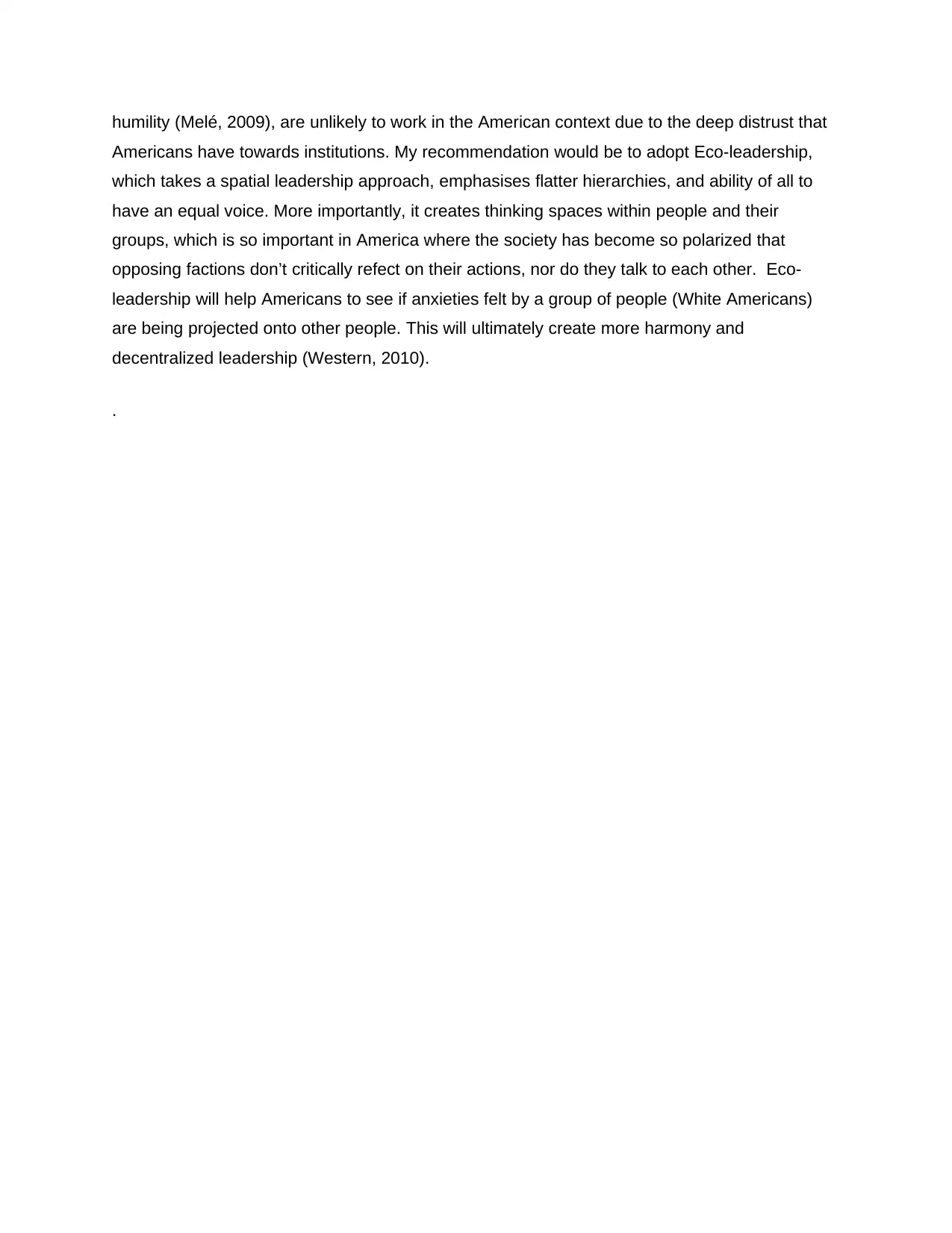
humility (Melé, 2009), are unlikely to work in the American context due to the deep distrust that
Americans have towards institutions. My recommendation would be to adopt Eco-leadership,
which takes a spatial leadership approach, emphasises flatter hierarchies, and ability of all to
have an equal voice. More importantly, it creates thinking spaces within people and their
groups, which is so important in America where the society has become so polarized that
opposing factions don’t critically refect on their actions, nor do they talk to each other. Eco-
leadership will help Americans to see if anxieties felt by a group of people (White Americans)
are being projected onto other people. This will ultimately create more harmony and
decentralized leadership (Western, 2010).
.
Americans have towards institutions. My recommendation would be to adopt Eco-leadership,
which takes a spatial leadership approach, emphasises flatter hierarchies, and ability of all to
have an equal voice. More importantly, it creates thinking spaces within people and their
groups, which is so important in America where the society has become so polarized that
opposing factions don’t critically refect on their actions, nor do they talk to each other. Eco-
leadership will help Americans to see if anxieties felt by a group of people (White Americans)
are being projected onto other people. This will ultimately create more harmony and
decentralized leadership (Western, 2010).
.
Paraphrase This Document
Need a fresh take? Get an instant paraphrase of this document with our AI Paraphraser
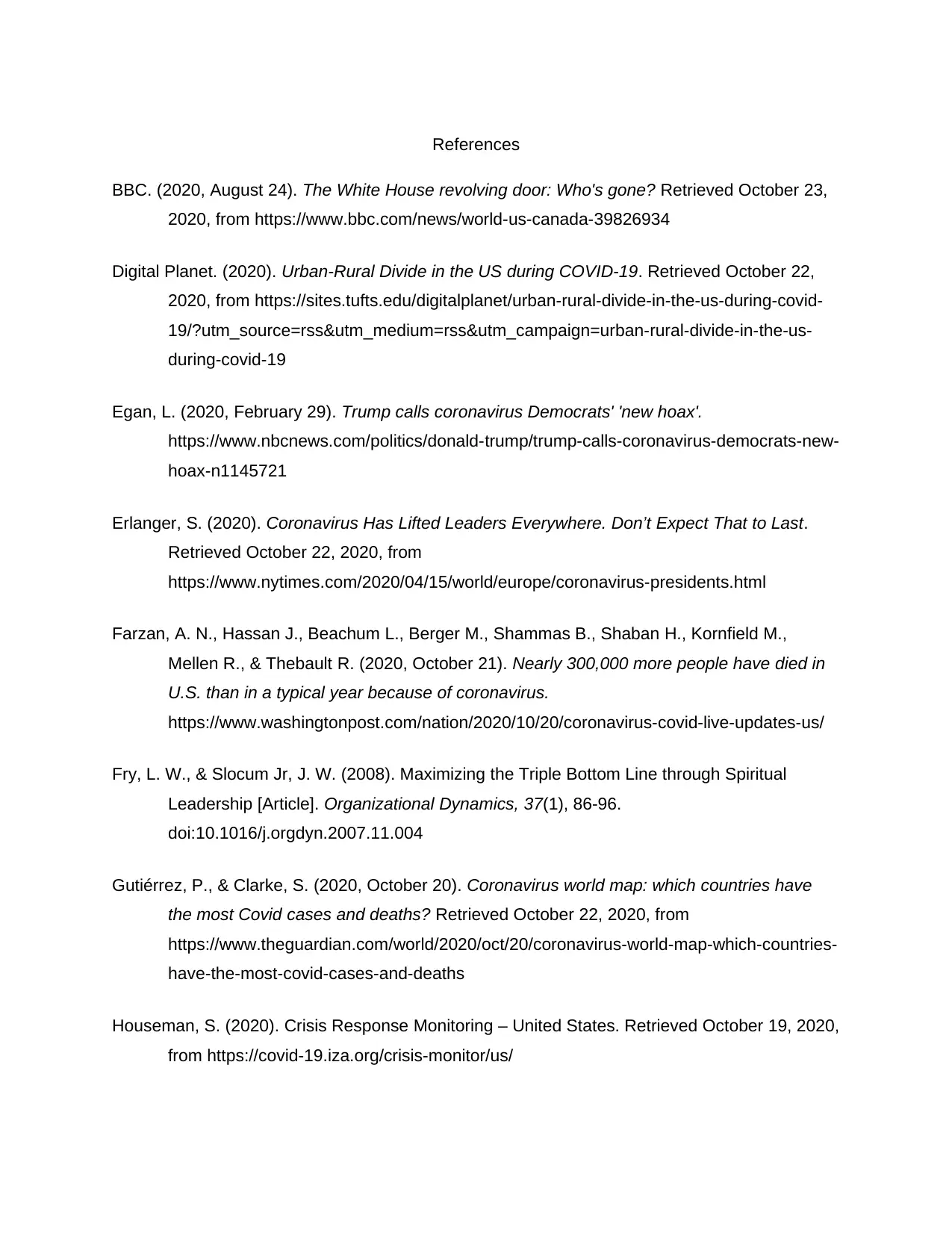
References
BBC. (2020, August 24). The White House revolving door: Who's gone? Retrieved October 23,
2020, from https://www.bbc.com/news/world-us-canada-39826934
Digital Planet. (2020). Urban-Rural Divide in the US during COVID-19. Retrieved October 22,
2020, from https://sites.tufts.edu/digitalplanet/urban-rural-divide-in-the-us-during-covid-
19/?utm_source=rss&utm_medium=rss&utm_campaign=urban-rural-divide-in-the-us-
during-covid-19
Egan, L. (2020, February 29). Trump calls coronavirus Democrats' 'new hoax'.
https://www.nbcnews.com/politics/donald-trump/trump-calls-coronavirus-democrats-new-
hoax-n1145721
Erlanger, S. (2020). Coronavirus Has Lifted Leaders Everywhere. Don’t Expect That to Last.
Retrieved October 22, 2020, from
https://www.nytimes.com/2020/04/15/world/europe/coronavirus-presidents.html
Farzan, A. N., Hassan J., Beachum L., Berger M., Shammas B., Shaban H., Kornfield M.,
Mellen R., & Thebault R. (2020, October 21). Nearly 300,000 more people have died in
U.S. than in a typical year because of coronavirus.
https://www.washingtonpost.com/nation/2020/10/20/coronavirus-covid-live-updates-us/
Fry, L. W., & Slocum Jr, J. W. (2008). Maximizing the Triple Bottom Line through Spiritual
Leadership [Article]. Organizational Dynamics, 37(1), 86-96.
doi:10.1016/j.orgdyn.2007.11.004
Gutiérrez, P., & Clarke, S. (2020, October 20). Coronavirus world map: which countries have
the most Covid cases and deaths? Retrieved October 22, 2020, from
https://www.theguardian.com/world/2020/oct/20/coronavirus-world-map-which-countries-
have-the-most-covid-cases-and-deaths
Houseman, S. (2020). Crisis Response Monitoring – United States. Retrieved October 19, 2020,
from https://covid-19.iza.org/crisis-monitor/us/
BBC. (2020, August 24). The White House revolving door: Who's gone? Retrieved October 23,
2020, from https://www.bbc.com/news/world-us-canada-39826934
Digital Planet. (2020). Urban-Rural Divide in the US during COVID-19. Retrieved October 22,
2020, from https://sites.tufts.edu/digitalplanet/urban-rural-divide-in-the-us-during-covid-
19/?utm_source=rss&utm_medium=rss&utm_campaign=urban-rural-divide-in-the-us-
during-covid-19
Egan, L. (2020, February 29). Trump calls coronavirus Democrats' 'new hoax'.
https://www.nbcnews.com/politics/donald-trump/trump-calls-coronavirus-democrats-new-
hoax-n1145721
Erlanger, S. (2020). Coronavirus Has Lifted Leaders Everywhere. Don’t Expect That to Last.
Retrieved October 22, 2020, from
https://www.nytimes.com/2020/04/15/world/europe/coronavirus-presidents.html
Farzan, A. N., Hassan J., Beachum L., Berger M., Shammas B., Shaban H., Kornfield M.,
Mellen R., & Thebault R. (2020, October 21). Nearly 300,000 more people have died in
U.S. than in a typical year because of coronavirus.
https://www.washingtonpost.com/nation/2020/10/20/coronavirus-covid-live-updates-us/
Fry, L. W., & Slocum Jr, J. W. (2008). Maximizing the Triple Bottom Line through Spiritual
Leadership [Article]. Organizational Dynamics, 37(1), 86-96.
doi:10.1016/j.orgdyn.2007.11.004
Gutiérrez, P., & Clarke, S. (2020, October 20). Coronavirus world map: which countries have
the most Covid cases and deaths? Retrieved October 22, 2020, from
https://www.theguardian.com/world/2020/oct/20/coronavirus-world-map-which-countries-
have-the-most-covid-cases-and-deaths
Houseman, S. (2020). Crisis Response Monitoring – United States. Retrieved October 19, 2020,
from https://covid-19.iza.org/crisis-monitor/us/
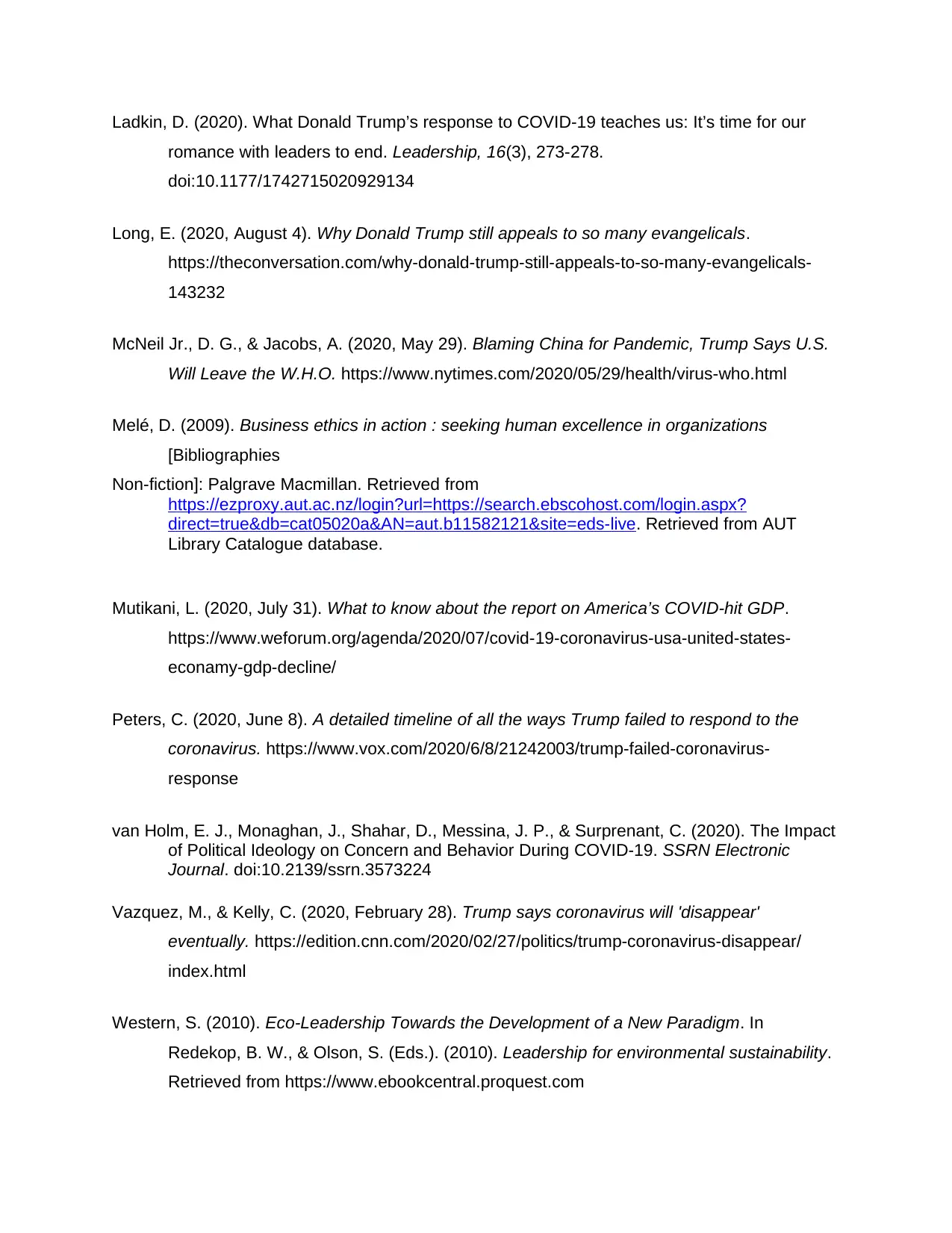
Ladkin, D. (2020). What Donald Trump’s response to COVID-19 teaches us: It’s time for our
romance with leaders to end. Leadership, 16(3), 273-278.
doi:10.1177/1742715020929134
Long, E. (2020, August 4). Why Donald Trump still appeals to so many evangelicals.
https://theconversation.com/why-donald-trump-still-appeals-to-so-many-evangelicals-
143232
McNeil Jr., D. G., & Jacobs, A. (2020, May 29). Blaming China for Pandemic, Trump Says U.S.
Will Leave the W.H.O. https://www.nytimes.com/2020/05/29/health/virus-who.html
Melé, D. (2009). Business ethics in action : seeking human excellence in organizations
[Bibliographies
Non-fiction]: Palgrave Macmillan. Retrieved from
https://ezproxy.aut.ac.nz/login?url=https://search.ebscohost.com/login.aspx?
direct=true&db=cat05020a&AN=aut.b11582121&site=eds-live. Retrieved from AUT
Library Catalogue database.
Mutikani, L. (2020, July 31). What to know about the report on America’s COVID-hit GDP.
https://www.weforum.org/agenda/2020/07/covid-19-coronavirus-usa-united-states-
econamy-gdp-decline/
Peters, C. (2020, June 8). A detailed timeline of all the ways Trump failed to respond to the
coronavirus. https://www.vox.com/2020/6/8/21242003/trump-failed-coronavirus-
response
van Holm, E. J., Monaghan, J., Shahar, D., Messina, J. P., & Surprenant, C. (2020). The Impact
of Political Ideology on Concern and Behavior During COVID-19. SSRN Electronic
Journal. doi:10.2139/ssrn.3573224
Vazquez, M., & Kelly, C. (2020, February 28). Trump says coronavirus will 'disappear'
eventually. https://edition.cnn.com/2020/02/27/politics/trump-coronavirus-disappear/
index.html
Western, S. (2010). Eco-Leadership Towards the Development of a New Paradigm. In
Redekop, B. W., & Olson, S. (Eds.). (2010). Leadership for environmental sustainability.
Retrieved from https://www.ebookcentral.proquest.com
romance with leaders to end. Leadership, 16(3), 273-278.
doi:10.1177/1742715020929134
Long, E. (2020, August 4). Why Donald Trump still appeals to so many evangelicals.
https://theconversation.com/why-donald-trump-still-appeals-to-so-many-evangelicals-
143232
McNeil Jr., D. G., & Jacobs, A. (2020, May 29). Blaming China for Pandemic, Trump Says U.S.
Will Leave the W.H.O. https://www.nytimes.com/2020/05/29/health/virus-who.html
Melé, D. (2009). Business ethics in action : seeking human excellence in organizations
[Bibliographies
Non-fiction]: Palgrave Macmillan. Retrieved from
https://ezproxy.aut.ac.nz/login?url=https://search.ebscohost.com/login.aspx?
direct=true&db=cat05020a&AN=aut.b11582121&site=eds-live. Retrieved from AUT
Library Catalogue database.
Mutikani, L. (2020, July 31). What to know about the report on America’s COVID-hit GDP.
https://www.weforum.org/agenda/2020/07/covid-19-coronavirus-usa-united-states-
econamy-gdp-decline/
Peters, C. (2020, June 8). A detailed timeline of all the ways Trump failed to respond to the
coronavirus. https://www.vox.com/2020/6/8/21242003/trump-failed-coronavirus-
response
van Holm, E. J., Monaghan, J., Shahar, D., Messina, J. P., & Surprenant, C. (2020). The Impact
of Political Ideology on Concern and Behavior During COVID-19. SSRN Electronic
Journal. doi:10.2139/ssrn.3573224
Vazquez, M., & Kelly, C. (2020, February 28). Trump says coronavirus will 'disappear'
eventually. https://edition.cnn.com/2020/02/27/politics/trump-coronavirus-disappear/
index.html
Western, S. (2010). Eco-Leadership Towards the Development of a New Paradigm. In
Redekop, B. W., & Olson, S. (Eds.). (2010). Leadership for environmental sustainability.
Retrieved from https://www.ebookcentral.proquest.com
⊘ This is a preview!⊘
Do you want full access?
Subscribe today to unlock all pages.

Trusted by 1+ million students worldwide
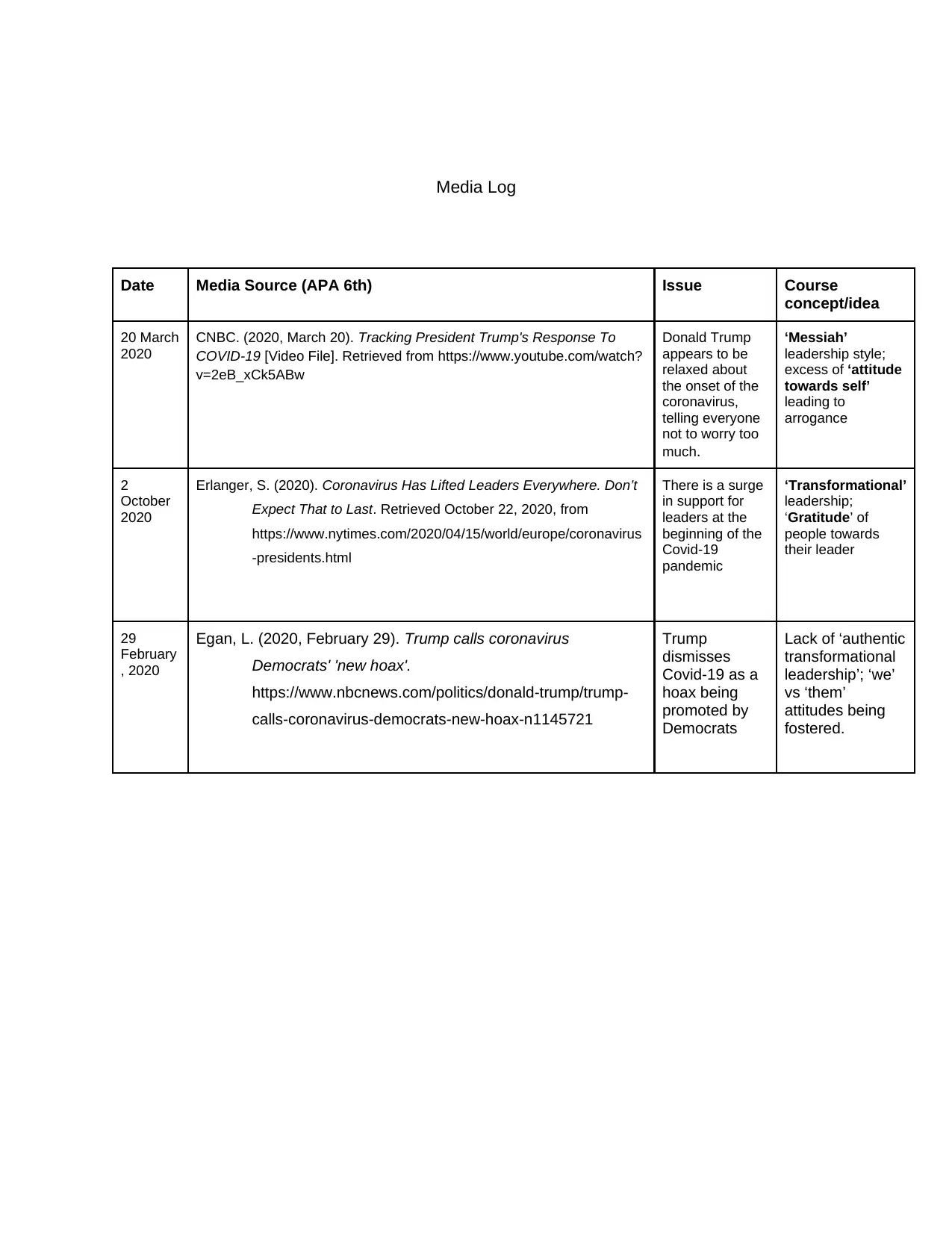
Media Log
Date Media Source (APA 6th) Issue Course
concept/idea
20 March
2020
CNBC. (2020, March 20). Tracking President Trump's Response To
COVID-19 [Video File]. Retrieved from https://www.youtube.com/watch?
v=2eB_xCk5ABw
Donald Trump
appears to be
relaxed about
the onset of the
coronavirus,
telling everyone
not to worry too
much.
‘Messiah’
leadership style;
excess of ‘attitude
towards self’
leading to
arrogance
2
October
2020
Erlanger, S. (2020). Coronavirus Has Lifted Leaders Everywhere. Don’t
Expect That to Last. Retrieved October 22, 2020, from
https://www.nytimes.com/2020/04/15/world/europe/coronavirus
-presidents.html
There is a surge
in support for
leaders at the
beginning of the
Covid-19
pandemic
‘Transformational’
leadership;
‘Gratitude’ of
people towards
their leader
29
February
, 2020
Egan, L. (2020, February 29). Trump calls coronavirus
Democrats' 'new hoax'.
https://www.nbcnews.com/politics/donald-trump/trump-
calls-coronavirus-democrats-new-hoax-n1145721
Trump
dismisses
Covid-19 as a
hoax being
promoted by
Democrats
Lack of ‘authentic
transformational
leadership’; ‘we’
vs ‘them’
attitudes being
fostered.
Date Media Source (APA 6th) Issue Course
concept/idea
20 March
2020
CNBC. (2020, March 20). Tracking President Trump's Response To
COVID-19 [Video File]. Retrieved from https://www.youtube.com/watch?
v=2eB_xCk5ABw
Donald Trump
appears to be
relaxed about
the onset of the
coronavirus,
telling everyone
not to worry too
much.
‘Messiah’
leadership style;
excess of ‘attitude
towards self’
leading to
arrogance
2
October
2020
Erlanger, S. (2020). Coronavirus Has Lifted Leaders Everywhere. Don’t
Expect That to Last. Retrieved October 22, 2020, from
https://www.nytimes.com/2020/04/15/world/europe/coronavirus
-presidents.html
There is a surge
in support for
leaders at the
beginning of the
Covid-19
pandemic
‘Transformational’
leadership;
‘Gratitude’ of
people towards
their leader
29
February
, 2020
Egan, L. (2020, February 29). Trump calls coronavirus
Democrats' 'new hoax'.
https://www.nbcnews.com/politics/donald-trump/trump-
calls-coronavirus-democrats-new-hoax-n1145721
Trump
dismisses
Covid-19 as a
hoax being
promoted by
Democrats
Lack of ‘authentic
transformational
leadership’; ‘we’
vs ‘them’
attitudes being
fostered.
1 out of 7
Related Documents
Your All-in-One AI-Powered Toolkit for Academic Success.
+13062052269
info@desklib.com
Available 24*7 on WhatsApp / Email
![[object Object]](/_next/static/media/star-bottom.7253800d.svg)
Unlock your academic potential
Copyright © 2020–2026 A2Z Services. All Rights Reserved. Developed and managed by ZUCOL.





